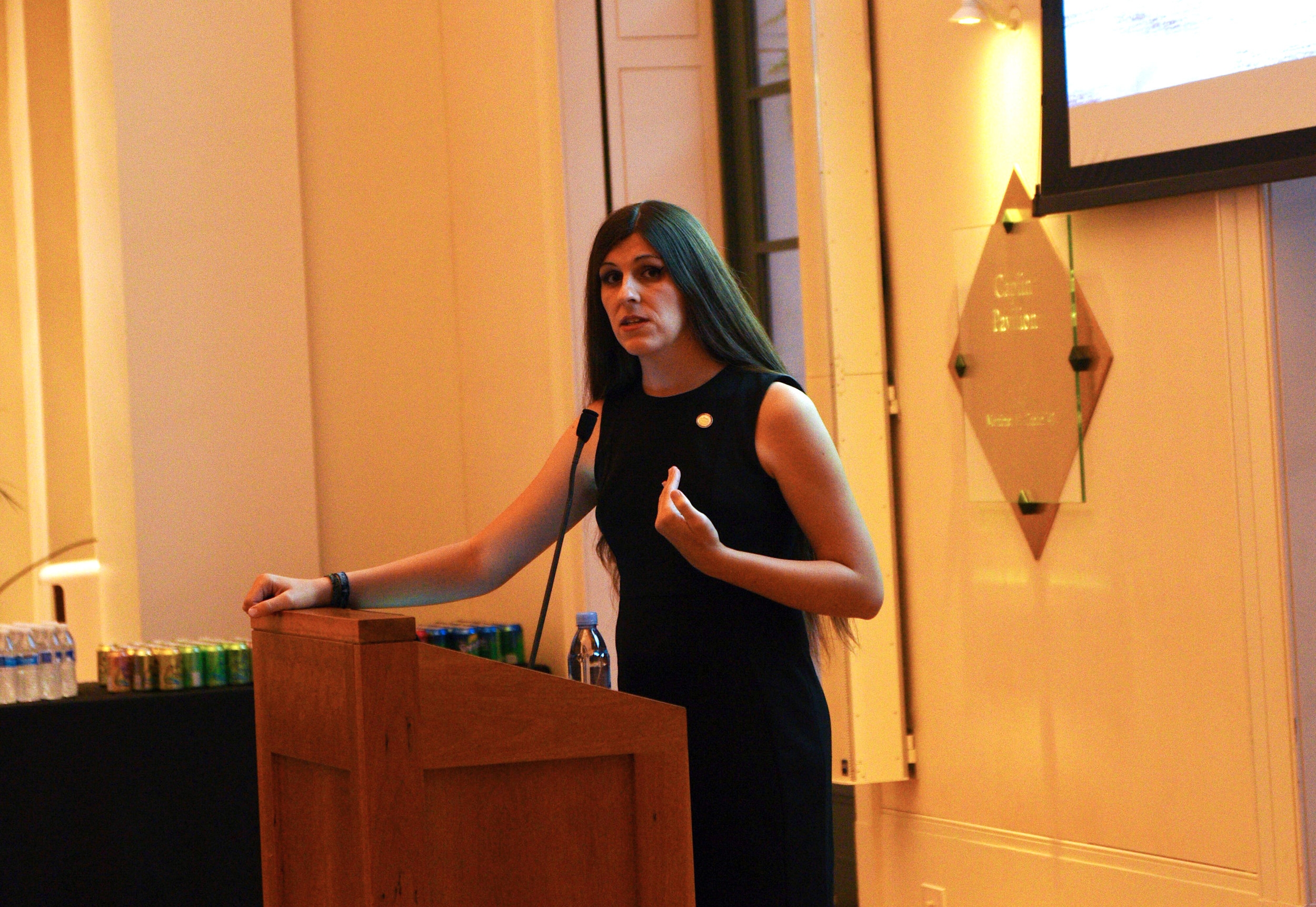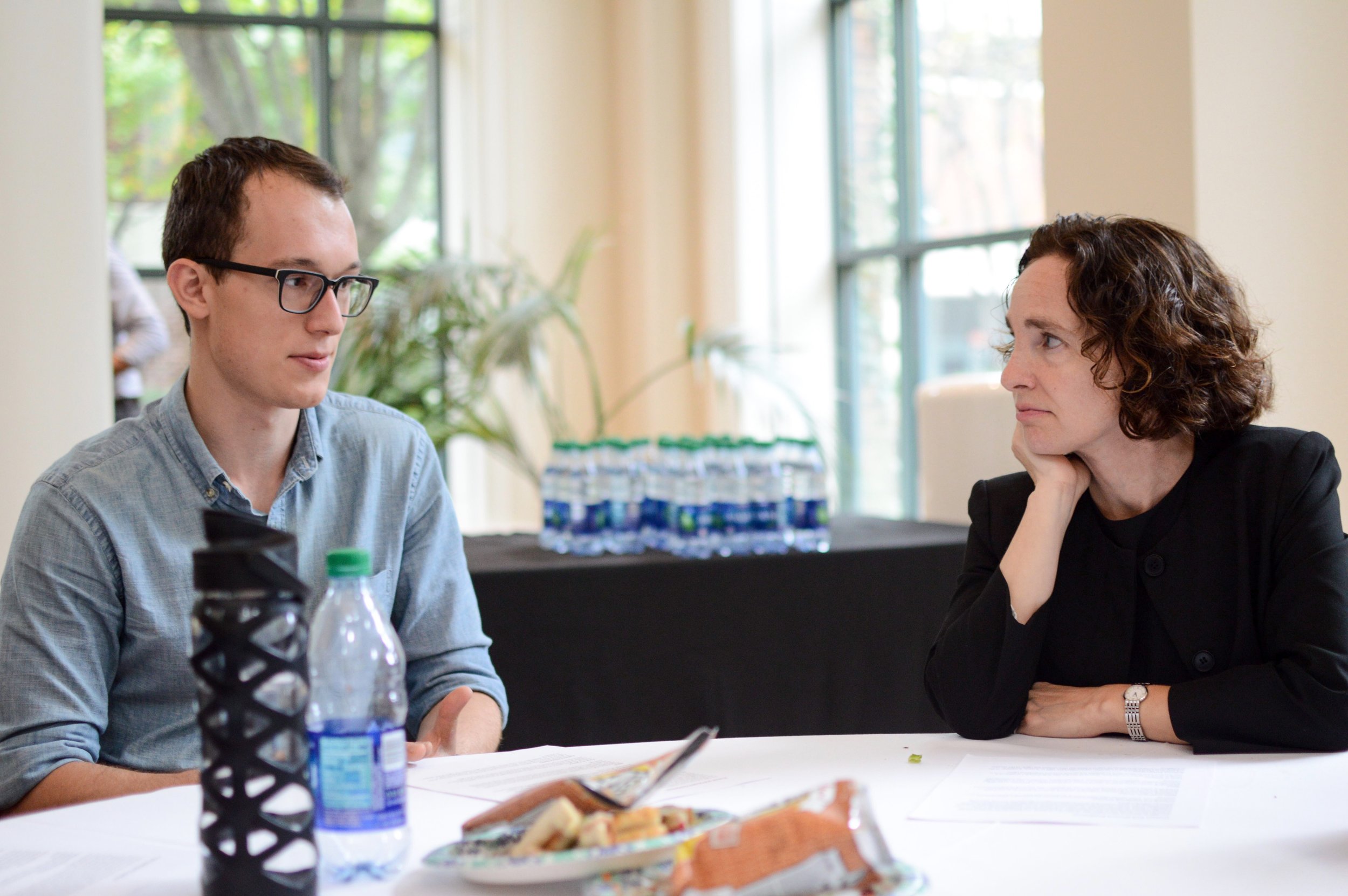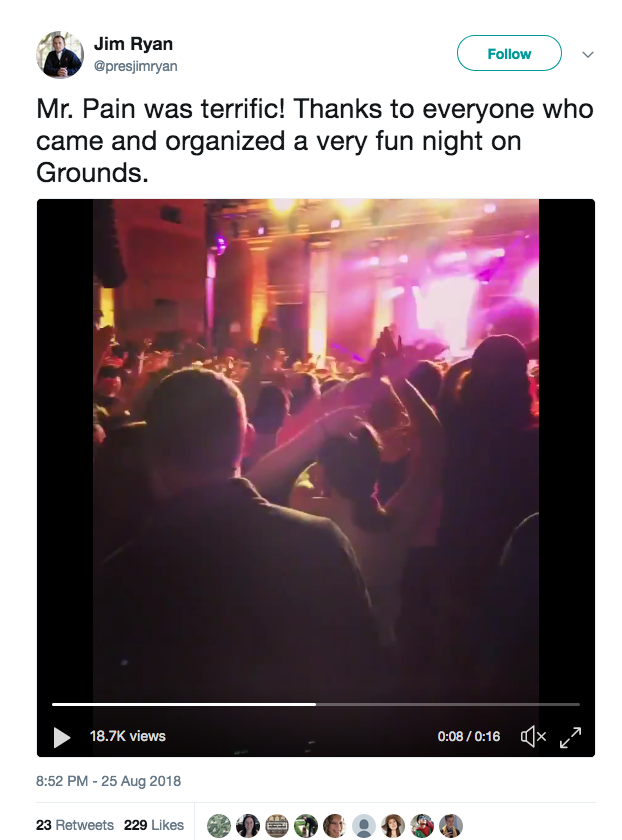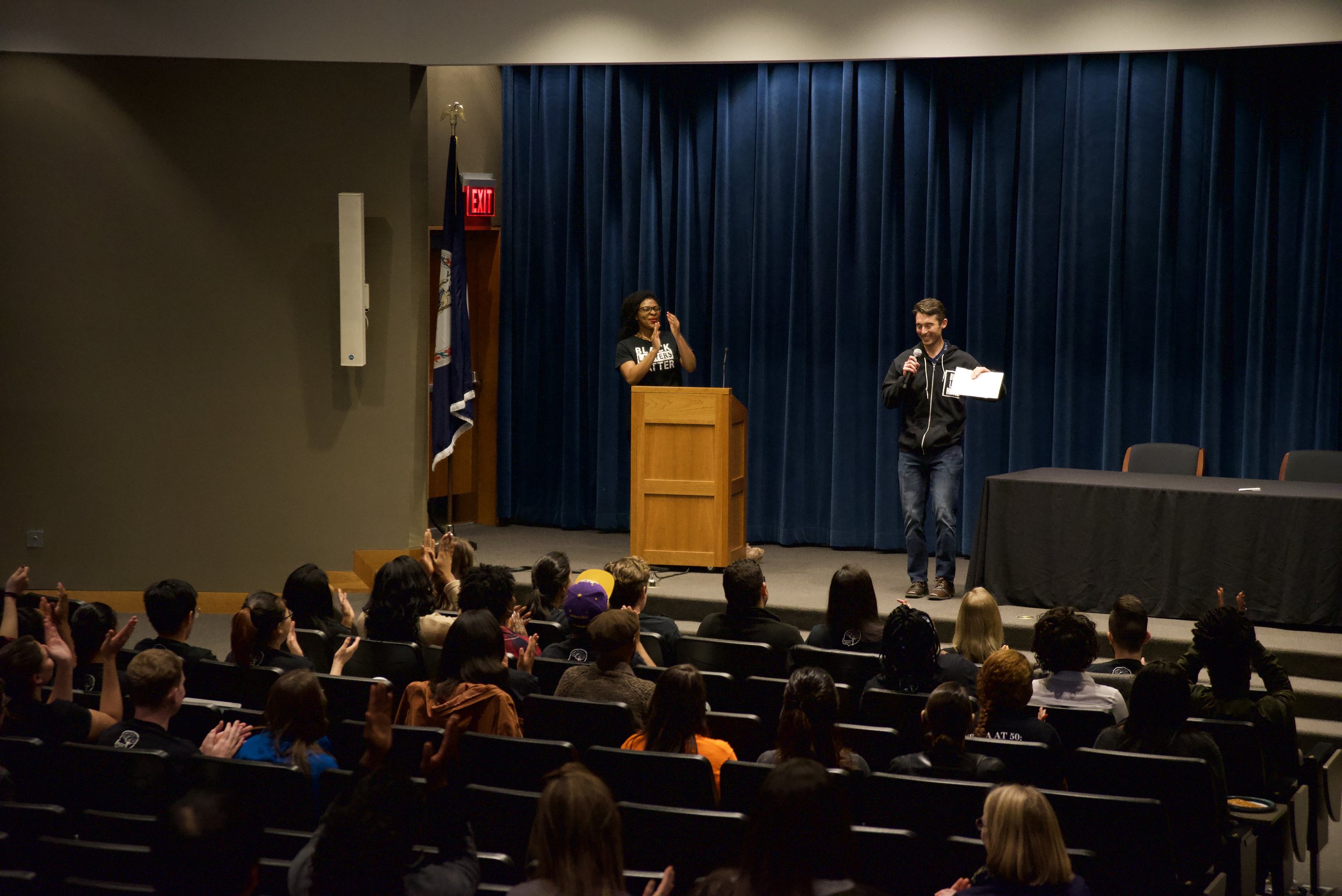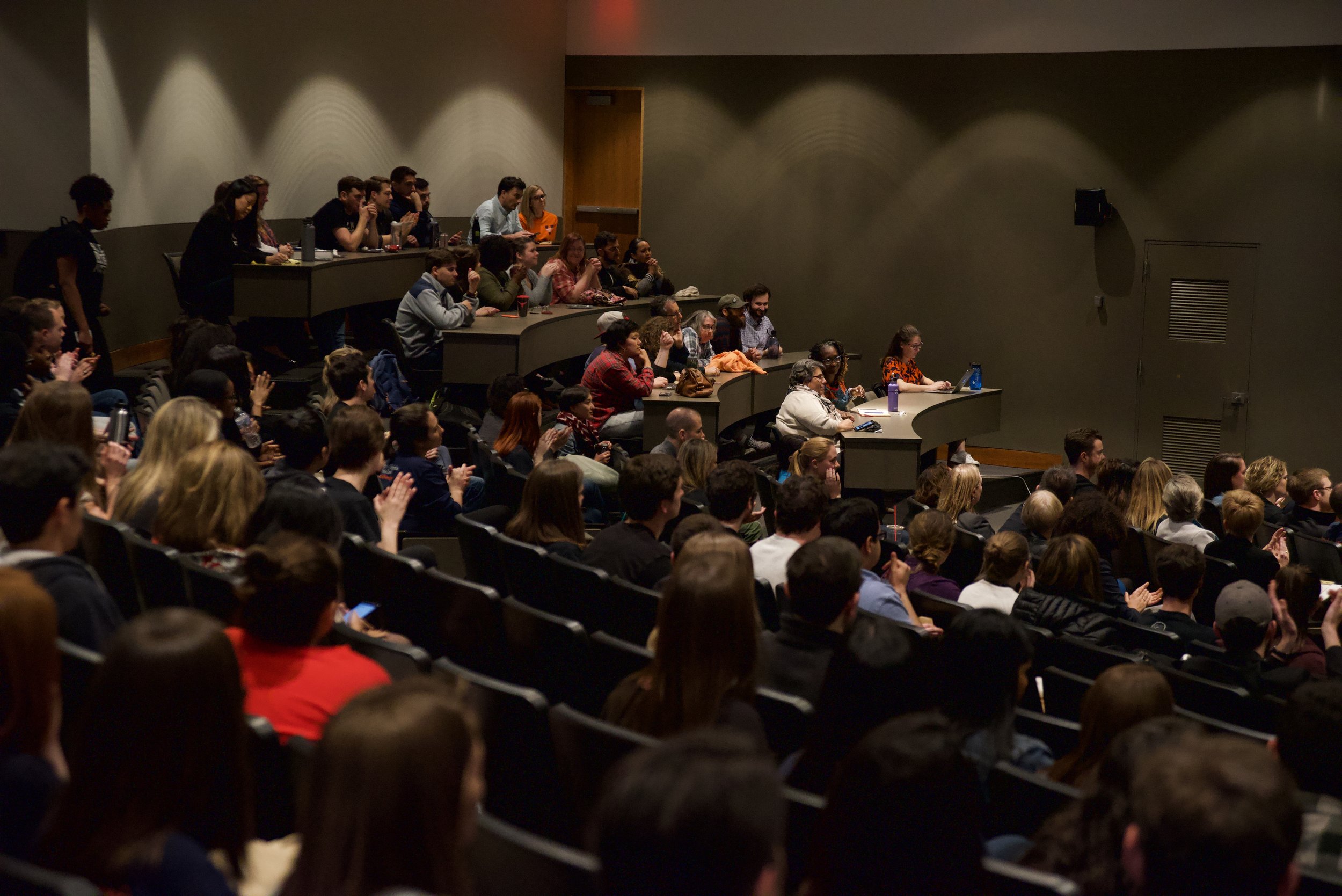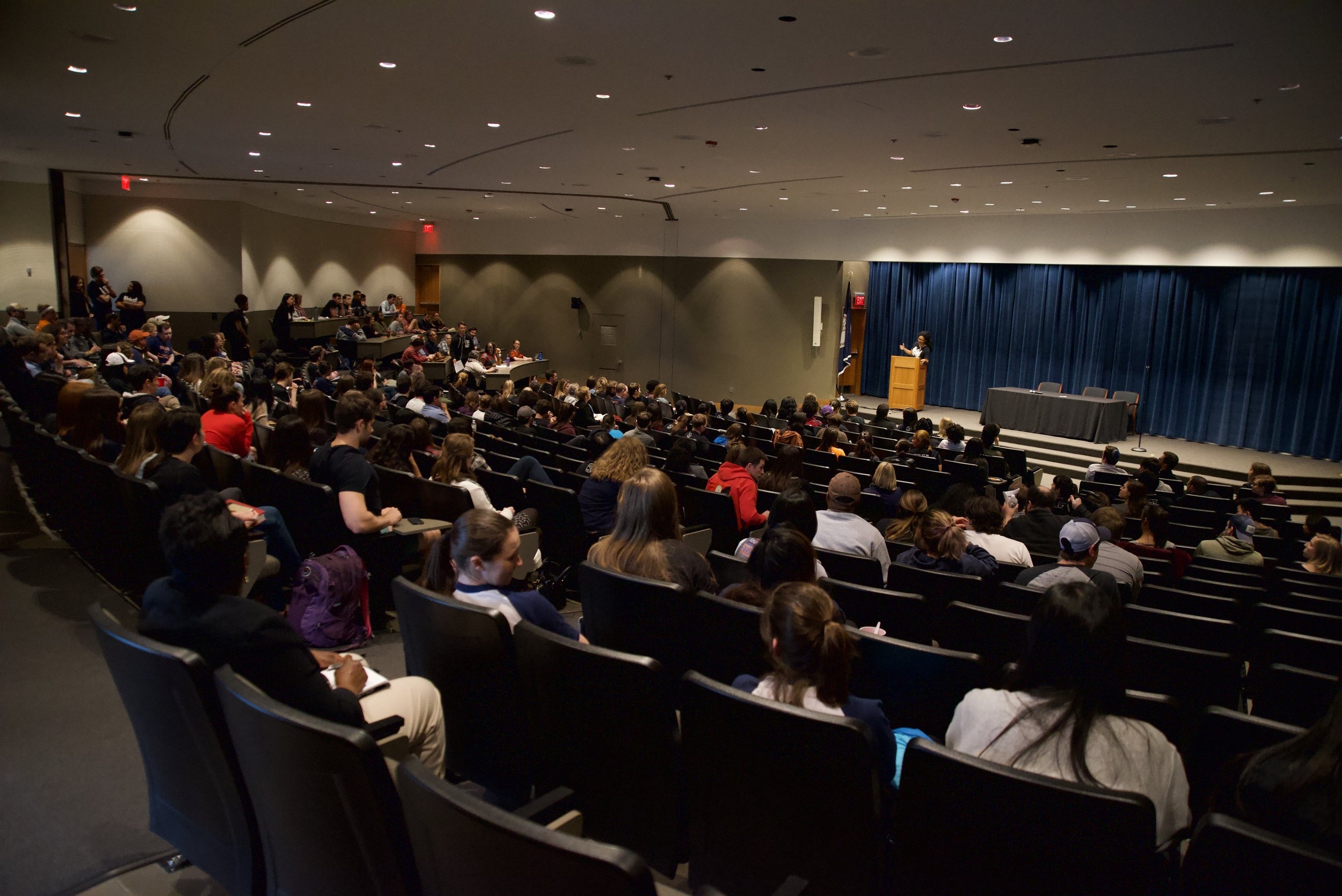On April 19, representatives from the Law School’s Minority Rights Coalition hosted a town hall meeting in Caplin Auditorium to give students a forum to discuss their reactions and experiences, to hear from faculty members and the deans, then to break into smaller groups to come up with action items to submit to the school administration.
Before the speeches began, rumors swirled about the possibility the intruder would attend that evening. “This was a student-organized and -led event and it was not widely circulated, so we believe it is unlikely. But members of the community are here, so there’s a non-zero percent chance,” Dean Kendrick told the Law Weekly. The school’s regular security guard showed up early to be present for the event and a plainclothes officer was seated in the audience.
First to speak were representatives from the Jewish Law Students Association (JLSA), who recounted the anti-Semitic statements made while the intruder walked around the hallways. He confronted students for “looking very Jewish” and filmed another Jewish student in the hallways, saying that it was evidence of a Jewish conspiracy to harass him. He said to another student that women and Jews should not be allowed in law school.
“Stereotyping and vilification of Jews is not new; it’s the same tactics used by Hitler and the Nazis in Europe, who murdered 6 million Jews during the Holocaust,” the pair of JLSA representatives explained. “We remember those who were killed during the Holocaust every day, but the timing of his visit to the Law School was not lost on Jewish students, as Yom HaShoah, the Holocaust Remembrance holiday, was last Wednesday.” They ended their remarks by explaining the Jewish concept of tikkun o’lam, that the world was created broken and everyone has the responsibility to make their communities whole and the world a better place.
Representatives from BLSA followed with their remarks about the event. Courtney Davis ’20, BLSA’s education chair, related to the group how she stepped out of the library briefly during the incident, leaving her belongings at a table on the second floor. Davis recounted how having to leave the library made her feel. “People were trying to be helpful by asking me if they could grab my backpack for me,” Davis said. She explained her feelings of embarrassment and alienation in that moment—that this was no longer her school if she did not feel safe to go into the library because of the color of her skin.
“Later in the day I stopped into the library to print,” recalled the second speaker. “Someone who I didn’t know asked me if I was doing okay. I appreciated that check-in from a member of our community.” The speaker ended by challenging those in the audience to “think critically about what being an ally looks like.”
Alex Viner ‘20, a representative from Lambda, took to the stage next, and said, “At first I didn’t know who this person was, so I looked at his Twitter account.” Notably, a majority of students who spoke to the Law Weekly had also never heard of the intruder before Wednesday. “After scrolling through and reading his feed, I called my mom, whose family were refugees from the former Soviet Union who came to the United States to escape anti-Semitism.” According to Viner, after he told his mom what he had seen, she replied, “This is what we were escaping.”
“My experiences were really frustrating,” said Adele Stichel ’19, Lambda’s second representative. “ I was told that the police had done a walk-through, but this is someone who will provoke people or even punch people. I was afraid he would bump into someone and accuse someone of assaulting them. He knows how to manipulate the criminal justice system—he is dangerous.” Stichel said that one of the police officers asked her why she was there, and accused her of making the intruder feel unsafe. Taken aback by the question, Stichel suddenly felt alone in the confrontation with the officer, until she turned her head and saw a group of classmates standing behind her. “They had my back.”
Robbie ’19, former president of LALO, and A.D., a member of SALSA, addressed the fact that many students had trouble concentrating in class, some decided not to attend class at all out of fear that the intruder carried a weapon. “What a privilege it must be to have this event occur and it not affect you.”
Michelle and Stanley represented APALSA in their speech at the town hall. Michelle began by exclaiming, “I don’t have time for this!” The statement was met with nods and snapping fingers in agreement. “Nobody acknowledged this was happening, [and] I was reevaluating why I came here. I felt like I didn’t matter because of the color of my skin,” Michelle said, echoing the anger felt by many students of color on Wednesday. “If the school is serious about the school’s commitment to inclusion, we should change our curriculum to have classes that talk about [race], and professors that acknowledge that.”
Stanley was also present at school during the event and witnessed the intruder walk around the first floor while videotaping students. "He was telling the police that he felt threatened by the crowd, and that he was just minding his own business in the library when students came to harass him. But that’s not what happened,” Stanley told the Law Weekly. Other students interviewed confirmed that the intruder came to the library without pens or paper; one witness said they saw him pull an old statute book from the shelf—despite the unwelcome visitor’s claim that he came to the law library to conduct legal research on his current cases.
“I think he came here because he felt emboldened as a white supremacist to step into this school to make his point. He must not have felt very threatened [when he chose] to stay on Grounds for over an hour, walk through our halls and library, stream his tour here to his followers on Twitter, and look at a student and say, ‘Why is it that these really Jewish looking guys are always the ones that are running their mouths?’" recalled Stanley.
Courtney Koelbel ’19, Director for the UVa National Lawyers’ Guild chapter and a representative of Women of Color, was a legal observer during the rallies in August, and felt the memories of trauma from that day flood back to her on Wednesday. “On August 12, I watched as Nazis walked passed me, that all came back to me when I heard that [the intruder] was in the library.”
Doherty was the first member of the faculty to speak at the town hall event. He reminded students that there is a “community of people in the town that are here to love and protect all of you as well,” pointing to about a dozen community members gathered in the audience. “I have confronted [the intruder] in public settings and I have been outspoken in the resistance to his views and settings,” Doherty said, but he acknowledged that he did not want his activism to put people at his place of work in danger. “I will continue to confront [the intruder]’s racist views and actions,” Doherty said, and encouraged students to do the same. “You all have power, you really do,” he said, while asking students to contact members of the administration at UVa to issue a no-trespass order. In a moment of levity, Doherty announced, “We will be cooking grilled cheese in the library, and [that man] can’t have any.” His statement was met with whoops and cheers from the audience.
Professor Anne Coughlin spoke next, discussing her ongoing efforts to pursue legal action against the intruder and other white supremacists who threaten students and community members. She began her work even before the August 11 and 12 rallies. “I kept telling people, ‘don’t worry, we will get him next time,’ but this was the next time.” She believes that by now the University Police have gathered all the facts needed for UVa to issue a no-trespass order against the intruder and for Albemarle County to bring criminal charges against him and other perpetrators of the violence on August 11. She urged students to get in touch with the Commonwealth’s Attorney and demand that the individuals be brought to justice. Professor Coughlin also encouraged students to continue protesting and demanding action against known white supremacists by UVa. “Contact your local [Board of Visitors] member; tell them I sent you.”
In a tearful response to student questions about why the school did not issue an email until six hours after the event, Dean Kendrick and Dean Goluboff jointly apologized to the audience. “I want you all to know how glad I am to be here, how proud I am of all of you. We can do better and we will do better. I apologize, I see that was my job to protect my students and I failed,” said Dean Goluboff. At the time of the incident, she was travelling in the Northeast and Dean Kendrick was in Richmond preparing for oral arguments, which she gave before the Virginia Supreme Court the morning of the town hall. Stephen T. Parr took the reins and the deans collectively spent time weighing their response. During the library incident, the intruder confronted Dean Parr in an attempt to file a complaint against Doherty, who was remaining out of sight.
Both deans stayed for the entirety of the town hall and participated in the brainstorming session. “I have enormous pride; I am looking forward to hearing what you come up with. My door is always open, my door is always open,” said Dean Goluboff. Many students who spoke to the Law Weekly remained critical of the administration’s response, but felt the apology was genuine and trust the deans will implement the suggestions given by students during the brainstorming session.
In a formal statement, the deans reiterated, “Our students and the Law School community responded to this event in the most constructive way possible. Going forward we will be listening to our students and communicating with them about our obligations under university policy and the law. As always, we will face challenges together as a community.”
Schmelkin also noted after the deans spoke, “I hope people are able to recognize how profoundly Dean Goluboff and Dean Kendrick have been impacted by the alt-right, and not only in their professional capacities. I know that they stand shoulder to shoulder with the students who showed up to the town hall. Charlottesville, UVa, and the Law School will doubtless have future run-ins and confrontations with [the intruder] and the alt-right. The students, staff, and faculty at the town hall give me hope that we will manage whatever comes our way.”
The action items discussed varied from crisis-situation training and instant notifications; setting up a clear chain of command; implementing a diversity class requirement along with PR and Professional Skills classes; and using funds from the Bridge Project to encourage conversations among diverse groups. Other suggestions included printing and distributing “Know Your Rights” pamphlets that students may use in real time should another event like this occur where police are present.
The importance of a unified emergency response system was highlighted by one black student who spoke to the Law Weekly: “I was heading to the library with my softball bat in hand at that time because I had a game at 6 p.m., which is totally innocent and also a very UVa Law thing, but I imagine a large black man coming near the intruder with an aluminum bat would not have been seen in the light most favorable to me, and this potentially incendiary situation was only prevented because I was alerted to the situation and knew not to go into the library with a bat via the Lambda GroupMe.”
“We attend a public school, and I recognize that means our facilities are open to the public—as they should be. But, when someone comes to this school with the sole intention of inciting hate, fear, and anger, they must be stopped,” said Hannah Fraher ’19. Agreeing with Professor Coughlin’s speech, Fraher said, “He has no place here, and I wholeheartedly support putting him on a no-trespass list to prevent him and his kind from coming here and splintering the unity we are working so hard to build.”
Every student who spoke with the Law Weekly had different and nuanced reactions to the events. Some drew comfort and solidarity from those who engaged with the intruder, and said, “To remain silent would tell other white supremacists that they too are welcome here, and to remain silent would be to do the work of white supremacy of dividing ourselves into those who belong, and those we leave behind."
Others felt deeply unsafe, and worried that engaging with him would incite his cronies. “His Twitter followers are neo-Nazis and white supremacists; he came here to give them a show. I am Jewish and was personally afraid that engaging him would fuel the fire to recreate August 11 at the Law School,” said one student who spoke to the Law Weekly on condition of anonymity. “When I saw that someone had replied ‘You are not welcome at the UVa Law Library’ on one of his early tweets about going to a library to study, all I thought was ‘oh great, now his Nazi friends know exactly where to show up.’ Holding up a sign that says ‘Blood on Your Hands,’ may to some feel like a gesture of solidarity, but I would rather get genuine solidarity from my classmates 364 days out of the year than just once a spectacle is already occurring. Only one person texted me to check in after the event.”
K.D., the student who requested that the crowd disperse, spoke to the Law Weekly about their request. "I told everyone to go back into the Law School to study when [the intruder] finally went outside. To some, this was the wrong thing to do because we have the right to show him how unwelcomed he was. To others, this was the best way to not only de-escalate the situation but to also disincentivize him from coming back to our Law School to troll.” K.D. cautioned that differing approaches should be demonstrative of the many ways to handle the situation, not to contradict each other.
The student concluded, “Silence is certainly inexcusable; however, ignoring [the intruder] last Wednesday led to action: unified action. For that, I am proud of my part in our response to his bigotry. I implore the entire Law School community to find a way to organize against white supremacy because if his presence on our campus didn't affect you, you are a part of the problem."
As the dust settles and we return to preparing for finals and graduation, the events of April 18 may fade into a blip or may be inextricably woven into the fabric of a student’s three years at UVa Law. If anything is clear from the last year, it is that racism and anti-Semitism can manifest themselves anywhere, including in our quiet college town. It is imperative that we wake up each day with the charge to make our community a more inclusive place. Students have different ideas about how to confront the ideologies that seek to divide us, but we are united in our desire for a Law School where every student can feel at home.
We are grateful for the students and faculty who spoke with us and for the patience of the Law School community while we conducted interviews this week.
--
Jenna Goldman
Editor Emeritus





